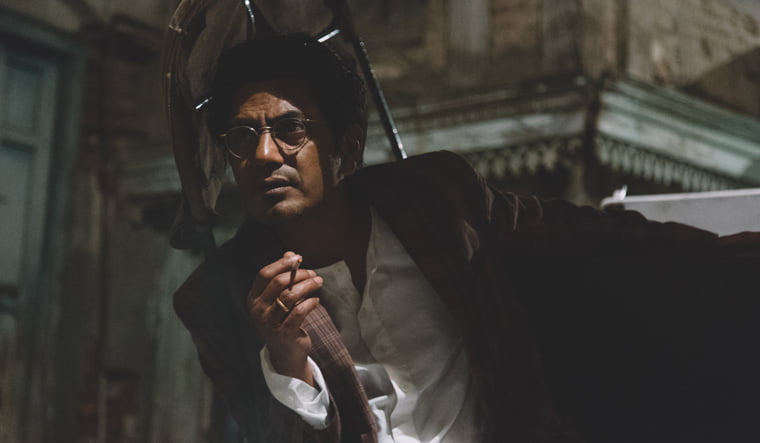Nandita Das’s Manto comes in times when every work of art is put under the microscope. Today art dare not present the naked truth. What if it offends someone who is living the very truth? Doesn’t mean that art shouldn’t be truthful, only convenient and easy on the eyes? Manto’s entire life revolved around breaking this bubble of convenient literature that shies away from its sole responsibility – being the mirror to the society.
In one of the beginning scenes, Manto boldly makes a proclamation that if his writing is found obscene, then we are truly living in unbearable times. A lot has been said and written about this movie but the unsettling realisation is its relevance in modern times, 63 years after Manto died in a different country. Separated by borders and politics, we sure seem to share the same values and take offences in the same details.
Also read: Manto Review: A Man Whose Story Is More Relevant Than Ever Today
Manto’s work in the movie is shown to empathise with women especially those who may never find a voice of their own because they lost it when they struck a deal for their bodies. This empathy towards the women crowns Manto with the title of ‘controversial writer’. It makes one wonder what makes a piece controversial? If it voices the struggles of the oppressed, it is controversial. If it tells the story of the untold, it is controversial. If it reflects the wrongdoings of one section of society on the other, it turns controversial.
In one of the profound court scenes, Manto’s work is charged with obscenity. He is defending his work by a simple logic that if the same obscenity in language is not frowned upon or curbed in colloquial terms then why are we against putting it on paper? He compares literature to be the mirror of society and if society cannot stomach its own image – isn’t the society actually that ugly?
He compares literature to be the mirror of society and if society cannot stomach its own image- isn’t the society actually that ugly?
Women are nothing more than carcasses on wall that proclaim our pride. Padmavat’s controversy was one such recent event that came with ridiculous threats of nose cutting. The queen never shows her belly. The queen never meets the Sultan. The queen never dances. It makes one wonder that if a queen who obviously belongs to upper caste/upper class is limited by such boundaries that curbs her physical and mental freedom, where do you and I stand? Oh, did I mention fictional? The queen was a fictional character from the poem Padmavat. But then, women are women, real or fictional. Unlike the oppression and patriarchy, which is fictional and hence obscene.
Curbing literary freedom to express reality and using it to present the comfortable ‘truth’ is like dressing up a cancer patient in new clothes. The society and democracy are slowly dying due to the unprecedented intolerance in the country today. Painting a pretty picture of women empowerment when rape and crimes of caste extremism are everyday news is shallow. Blowing the trumpet of Swachh Bharat when manual scavenging is the only means of livelihood for many is cowardice.
Another important and ‘over-used’ angle displayed in the movie Manto is the Hindu-Muslim relationship in India. Important, because it has to be talked about and ‘over-used’ because no matter the number of times it has been reiterated, the message just doesn’t seem to get through our thick skulls. India belongs to Indians as much Indians belong to this soil regardless of their religious affiliations.
We live in times when intolerance is the new nationalism. Ideas that are in conflict with majority is delinquent.
The pang of separation from Mumbai after he moves to Pakistan after the Partition haunts Manto till his death. He belonged to India and his people. Just like the many Muslims who braved to stay on this side of the border only to be constantly bombed today with slogans like “Go to Pakistan”. Another chilling reflection in Manto is when he says, “We are all looking at the past while some are writing the present with blood and murder”.
Mughals and their conquests are a part of Indian history but the Indian Muslims are still paying a price living under the constant threat of lynching for practising their faith. Manto talks fondly and lovingly of Bombay like an old friend. Makes one wonder what constitutes patriotism – love and belongingness or geographical and political borders?
We live in times when intolerance is the new nationalism. Ideas that are in conflict with majority is delinquent. To harbour them is to invite death threats or worse, rape threats. Gauri Lankesh’s assassination was one such reminder. No courts, no trails. We get instant judgements on these mob-run courts.
In the words of Faiz Ahmed Faiz,
Speak, your lips are free.
Speak, it is your own tongue.
Speak, it is your own body.
Speak, your life is still yours.
Lips are free but words aren’t. Tongue is mine but the speech is curbed. Life hangs at the hands of the powerful who are easily offended.
Patriarchy still reigns. Communal hatred is prevalent. Vermins of caste keeps getting stronger with every flogging and caste hatred killing. It parades around naked just like the Dalit women who were made to parade naked for being Dalit and woman. Have we progressed at all since 1947?
Also read: Saadat Hasan Manto And His ‘Scandalous’ Women
Manto in one of the scenes reflects that with changing times, literature must change too. But have times really changed?
Featured Image Source: The Week
About the author(s)
Shyamala Rajasekar is an Instrumentation engineer in an Oil and Gas company.




